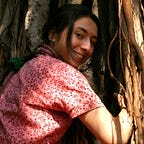The Rituals of Loss
The minute we parked, at least 5 people surrounded us, “kahaan se aaye ho?” (Where have you come from?). They did not want to know where we had driven in from, but the place we belong to. Belonging is a big part of our culture. It defines our ancestry and by extension, who we are, what we do, what we’re worth and who we are related to.
The eldest male among us replied — “Noormahal ke Khosla” (Khosla family from Noormahal). One person relayed that to the other till they finally came back with the name of the priest we had to find. Along the way, more of them met us, asked us for some information, provided some intel, took some money, and went on to the next group behind us. Our loss was their gain. Not just ours, but the hundreds that came through the banks of this river every single day to bid a final good bye to their loved ones. We were here to say good bye to the last son of the Noormahal ka Khosla parivar (parivar means family).
This is the first time I’m here. It is the first time I am conscious of what is going on. I have travelled 8,000 miles to be able to say this final good bye, but I was unsure of what it would feel like throughout the journey. I had never lost someone so important to me in my adult life. Now that I’m finally here, I feel numb.
My mother’s brother was like a father to me. He had no children of his own; he and his wife raised and treated me like their own — they introduced me to people as their daughter. I knew I was special, and I fulfilled what the role demanded for most parts. Till I started growing older, became a teenager, then half an adult and a full adult, more independent, less communicative, and all that was left was the love and respect for childhood bonds.
On January 22nd, 2013, my mother’s brother, my second father, had a stroke. It left the man who was the life and soul of this parivar, the energy of a party, the children’s favorite, in a vegetative state. He spent two years on and off life support, confined to a bed most of the times, unable to speak because of the feeding tube down his throat, gripping your hand so tight when he didn’t want to let go that you could swear he recognized you and knew what was happening around him. Even though he could barely move, he managed to hold the newspaper to read it like he always did, run his hand over his bald head in his usual style, and smile that loving, benevolent smile. When I walked into his room the first summer after grad school to surprise him, I could see the joy in his face. That summer, before leaving for Europe, when I went to say bye was the last time I saw him, alive or not.
But I’m kind of happy to say, that is not how I remember him. I have no recollection of that last meeting. What I cannot forget isthe image of him walking down the driveway of our house in Gurgaon. Or sitting in his usual chair in the living room. Or taking me shopping, and if I asked for one pair of shoe, buying me seven. I cannot forget the sound of “Bitua, kya haal hai?” (how are you, daughter?) over the phone, even though so many times I would not end up taking his calls because I was too busy doing some other non-trivial thing.
The reality of losing him has made me hold on to these things even more. This very real first loss in my life has made me appreciate the rituals of mourning. Not for the sake of the rituals, but for the process that they allow us to go through. For the remembrance. Sacrifices, rituals, mourning — they are our own ways of coping, of honoring the memory. The person who is gone has left, is not bound to these attachments anymore. It is we, the ones left behind, who feel the pain of loss and the need to cope with that loss.
And so this is one way that I am trying to cope. A year down the line. And I hope I never forget. Because life happens and we get consumed by our daily routines. With each passing day, the memory fades along with the pain. But I hope this memory stays alive. And to keep it alive, I institute a new ritual in my life — to serve someone less fortunate than me at least once a month, and pass on the love and joy with which I remember the last son of the lineage I carry in me.
